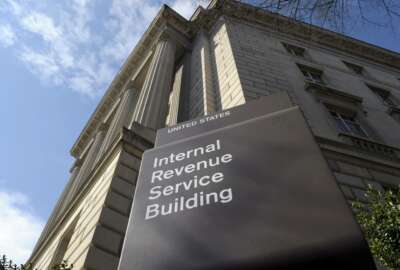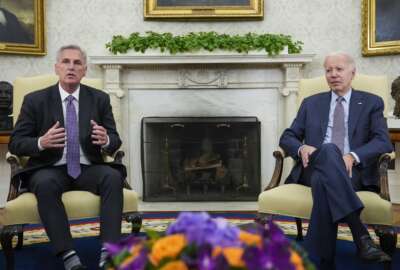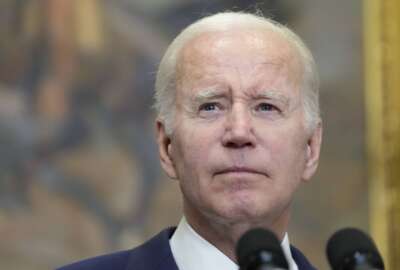
What does the latest debt ceiling deal mean for federal agencies?
Debt ceiling, debt ceiling, debt ceiling. It's all you've heard from members of Congress and those who cover it. Now that all parties involved have come to an...
Debt ceiling, debt ceiling, debt ceiling. It’s all you’ve heard from members of Congress and those who cover it. Now that all parties involved have come to an agreement to raise it, what does it mean for federal agency budgets? To find out, Federal Drive with Tom Temin spoke with WTOP Capitol Hill correspondent Mitchell Miller.
Interview Transcript:
Mitchell Miller Well, it’s a little bit different because it does combine the spending cuts along with raising the debt ceiling. So as far as legislation goes, it’s fairly straightforward. This is fairly short compared to a lot of other legislation that comes through. So, of course, the big headlines are that it extends the debt ceiling into 2025. It effectively freezes discretionary spending in the coming year and then limits growth to 1% the following year. It’s estimated that it could save $1.5 trillion over the next decade. Now, getting into some of the more nitty gritty issues. One of them, of course, affecting federal workers, is the federal agency that will be most affected by the debt ceiling legislation is the IRS. Lawmakers agreed that $10 billion can be repurposed from the agency in each of the next two fiscal years for a total of $20 billion. Now, that’s out of the $80 billion that Congress approved last year, and Republicans have been criticizing it ever since, charging that agents will be coming after average American taxpayers. Democrats rejecting that. Now, more immediately, it rescinds $1.4 billion that was approved last year. And there’s some disagreement about exactly how this will affect enforcement, as well as plans by the agency to improve customer service and upgrade its computer systems. Treasury officials have said plans to develop an online free file tax return system, which is is now being tested as a pilot, for instance, that will not be affected by the cuts. Now, a Congressional Budget Office report says with less funding for enforcement, the deficit could actually increase. This is something that House Speaker Kevin McCarthy has disputed. But nonetheless, IRS enforcement staff has shrunk by about one third over the past decade or so. So you can bet members of Congress from both parties will be closely monitoring how this part of the legislation is carried out.
Eric White Always easy to go after one of the least popular agencies or the politicians. What did members of the GOP feel that they or what were they upset that they didn’t get as part of this deal?
Mitchell Miller One of the biggest things is that many Republicans, particularly in the Senate, feel that this did not do enough to shore up defense spending. Democrats on the other side charged that this was a manufactured crisis over the debt ceiling to get a result that Republicans couldn’t get during the regular appropriations process. But as this moves forward, this is going to be an interesting thing to watch. It will affect appropriations. And the legislation includes a provision for an across the board 1% haircut on spending. If all 12 of the appropriations bills are not completed on time for the start of the fiscal year on October 1st. And as you well know, this rarely happens. The House usually does a better job of getting the appropriations bills out of committee and across the finish line. The Senate over the last several years and decades really has just not been able to get it done. And that’s often why it all ends up in this big omnibus bill at the end of the year. And that’s something that House Speaker Kevin McCarthy has said he wants to avoid. Now, what that 1% haircut also includes is defense and Veterans Affairs programs. And that’s one of the things that many Republicans are really upset about. There was a lot of talk about this during the final debate in the Senate related to this. I think what is going to happen, though, there are some backroom handshake deals and a variety of other things that are going to happen involving emergency funding for defense and that if there is a need and there is a definitely a will in the Senate to get more money for defense, whether it’s for the Pentagon or whether it’s for things like assisting Ukraine, they are going to come up with that money. But that was definitely a sore point for Republican senators.
Eric White Yeah, House Speaker McCarthy and many Republican members of Congress have used this to look at spending overall to try and get some cuts going in that direction. McCarthy even wants to establish a commission to look at spending. What can you tell me about that?
Mitchell Miller Right. He has been a little bit vague on this bipartisan commission that he wants, but essentially it would look at all parts of the federal budget for areas that could be cut or where spending could change. And as you know, there’s a long history of these type of panels going back to Simpson-Bowles. The Gang of Six and others have talked about this with Virginia Senator Mark Warner, who likes the idea. He just feels that it’s unfortunate that often what happens is these commissions get charged with making recommendations and then they’re ignored by Congress. Now, presumably they would look at Social Security and Medicare, which are, of course, two of the largest drivers of federal costs. But again, it really remains to be seen where this will go. Will these just be continually good ideas that are ways that government can actually reduce spending and figure out ways that Social Security and Medicare can be shored up in the coming years? Or will Congress say, well, thanks but no thanks, we appreciate the recommendations, but we’re going to do what we want to do because it’s politically expedient.
Eric White Not to mention members of budget committees in Ways and Means are probably saying, well, what do you think we’re doing over here?
Mitchell Miller Right, exactly. And that was something that Democrats brought up during this whole argument related to the debt ceiling process is that you have the House Budget Committee, the Senate Budget Committee have a Ways and Means committees. I mean, all of these committees have been already working on a lot of these spending levels. Now, obviously, the Republicans are happy about this because they ushered in a lot of things that they might not have been able to do through the committees, although House Speaker McCarthy has said he wants to return to regular order and get these committees to get their appropriations out in due time so that they come out by October 1st.
Eric White All right. And the big question is, are we going to have to do this whole dance again two years from now? It seemed as if President Biden was trying to establish some sort of precedent of saying the White House shouldn’t negotiate, but then ended up having to negotiate. So what’s it going to look like in 2025?
Mitchell Miller Right. I think we will likely end up in this same scenario, particularly if there is divided government. Now, of course, it depends on the presidential election in 2024, how things will shake out in the House and Senate as well. If President Biden were to be reelected and they’re still divided, you can bet that Republicans will go right back to this playbook. House Speaker Kevin McCarthy has indicated he would have no hesitation in doing so. After all, he got quite a bit out of this. They use this political leverage to make the changes we just talked about. Now, if a Republican, as elected president and Democrats still control either the House or the Senate, it’s going to be interesting to see if they support a clean debt ceiling approval bill, which they, of course, really called for all the way up until these negotiations had to start, or if they do something along the lines of what Republicans have done this year for their own priorities, I’ll be really interested to see what happens there.
Eric White Speaking with Mitchell Miller, WTOP’s Capitol Hill correspondent. And so let’s get back to actual legislation then. Republicans are still trying to push the issue of not letting feds do as much work from home. What is the status on any bills going towards that cause?
Mitchell Miller Right now, they’re kind of stuck in committee, but it remains a major interest for the House Oversight Committee chairman James Comer and many other Republicans. They’re really keeping a close eye on this and they’re trying to keep up the pressure on federal agencies to do more to get people back into the office. They’re continuing to call for the agencies to get the feds back into work rather than at home. And this is going to be an ongoing issue moving forward. South Carolina Republican Congresswoman Nancy Mace even floated the idea of firing workers who don’t come into the office in a recent interview with CBS News. If that type of effort were carried out, you can bet that unions representing federal workers would go to court. But it does reflect GOP frustration with the issue. And I guess we’ll continue to hear about this topic in the House hearings as they move forward.
Eric White Yeah, and also, you mentioned the calls for the IRS to reduce their workforce. That all sort of started online, with many Republican supporters worried about agents coming to get you. That all started, as you know, sort of a meme. And now the latest one also is that the Energy Department is going to ban gas stoves. And I guess the Republicans are once again taking those causes seriously. What is on the agenda?
Mitchell Miller Right. This is the proverbial hot topic in the culture wars, and it’s really into the Congress now. Two pieces of legislation are scheduled to come up this week related to gas stoves. One of them is called the Save Our Stoves Act, and that would prohibit the secretary of energy from finalizing or enforcing proposed rule changes related to energy standards. I was covering a hearing recently related to this one of the subcommittees of the House Oversight Committee. And as you can imagine, this is one that stirs up a lot of heated opinions one way or another. Republicans really pushing this hard, saying that the government is coming after gas stoves or at least effectively will be because they say if they impose the standards through the Energy Department, that the number of gas stoves being sold, for example, would be dramatically reduced. Democrats, on the other hand, say this is being overblown and that the Republicans are going too far with it. But it is an issue that’s actually taking up some time in Congress. And there’s another bill in connection with that called the Gas Stove Protection and Freedom Act. It would actually prohibit the use of federal funds to ban gas stoves. Now, the bottom line, of course, is nobody is going to show up at your door and cart away your gas stove. But it does show that there’s this continuing tug-of-war between the two political parties related to some of these hot button issues. And so this will, again, get some more attention this week.
Eric White And not to mention this is bread and butter for anybody going for reelection. And this is something that obviously people can understand and grasp.
Mitchell Miller Right? It’s very, very straightforward. It’s something that’s in your home. It’s literally a kitchen table issue. And I think that’s why a lot of Republicans have decided to press on this. I did notice as I was going through the language related to the proposals over the that are going to come up this week, that there’s a facetious proposal on the Democratic side, basically saying that they would want to add an amendment called the Appliance Bill of Rights. So you’re going to see a little bit more headlines related to this. And it may sound kind of tongue in cheek to a lot of people, but for a lot of people, this is a real issue about what the role of federal government is in connection with what happens with your home every day.
Copyright © 2025 Federal News Network. All rights reserved. This website is not intended for users located within the European Economic Area.
Tom Temin is host of the Federal Drive and has been providing insight on federal technology and management issues for more than 30 years.
Follow @tteminWFED





